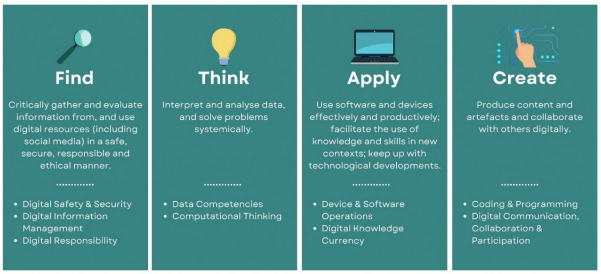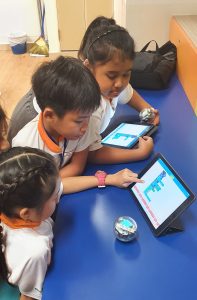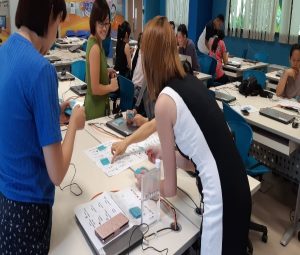ICT
Department Heads and Members
|
Mr Ow Kah Leong,
|
Mr Mohammed Nidzam,
|
|
Mdm Yap Huie Yuan, HOD/Curriculum |
Mdm Rasidah Bte Mohd Rasit,
|
|
Mr Chan Wei Shen,
|
Mdm Cham Kah Mien |
|
Mdm Lim Lan Shii |
Mdm Robert Juliet |
|
Mdm Sukainah Bte Mohd Mohsen |
Key Approaches
Digital Literacy
Digital Literacy (DL) is defined as a set of knowledge, skills and dispositions that would help our Frontierers to be confident, critical and responsible users of digital technologies for information, communication and problem-solving. The Find, Think, Apply, Create (FTAC) framework for DL was introduced when New Digital Literacy Programme (NDLP) was launched in 2020. Students will acquire digital skills across four components in the FTAC framework.
As part of the Edtech Masterplan 2030, the FTAC framework is unpacked into nine Digital Competencies (DCs) to support deepening of digital literacy in schools. These nine DCs will be developed from general education through post-secondary and higher education, and in the workforce. The development of the DCs will equip students with the abilities to Find, Think, Apply and Create effectively in a digitalised environment.

-
Integrate the various new media literacy skills into the curriculum to make the learning more relevant and authentic for the students.
-
Most of the lessons will be taught in school whereas some of the tasks will be for the students to complete at home.
-
This is done with the support of and in consultation with the various department heads so that the skills will be taught meaningfully and with context, instead of in isolation.
-
Examples include email-writing in P5 English and familiarizing with creating text and including media in Microsoft Word. Some other skills involved also include collaborating with one another via the SLS platform through the various tasks assigned (including IPW and post-assembly programmes).
-
Some of the skill sets involved are not subject-specific – such as being able to save documents and look up relevant information from reliable and trustworthy sources. However, some are – such as reading data (in Science) and digital media exploration (in Art).
-
Cyber Wellness
-
A comprehensive package that encompasses different platforms and avenues for the students to learn and apply cyber wellness.
-
FTGP
-
Assembly talks (differentiated)
-
Engage the Cyber Wellness Ambassadors to promote cyber wellness through creation of short video clips, pamphlets, etc.
-
HBL tasks for students to engage with their parents at home
-
Broad outcomes:
-
Pupils will be learners who are safe, respectful and responsible in the use of information and communication technology.
-
Pupils will be equipped with sound values and social-emotional competencies to navigate their use of cyberspace.

Learning Experiences
-
A comprehensive package that encompasses different platforms and avenues for the students to learn and apply cyber wellness.
-
FTGP
-
Assembly talks (differentiated)
-
Engage the Cyber Wellness Ambassadors to promote cyber wellness through creation of short video clips, pamphlets, etc.
-
HBL tasks for students to engage with their parents at home
-
Digital Lifeskills Programme
Our Digital Lifeskills Programme (DLP) is designed to shape Frontierers as adaptable designers of their own learning in the 21st Century. The DLP lessons are structured to expose students to various technology domains and skill sets at different levels, suitable for their learning. Students will be able to demonstrate 21st Century Competencies through computational thinking and logical thinking skills by the end of their primary school journey. Through these programmes, students are also encouraged to think creatively, reason systematically and work collaboratively, which are essential life skills as they enter the work force in the future.

|

|

|

|
Primary 2 students will get to learn basic block-based programming as well as the introduction of Microsoft Word to document some of their reflections and thoughts throughout the that particulate PAL module. Students in the middle block will be introduced to Maker Education during P3 SCCA while the Primary 4 students will try their hands at programming a robot using intermediate block-based programming. The students in the upper block will be involved in learning basic and intermediate coding, where they will learn to program a machine and creating their own simple applications.
|
Level |
P2 |
P4 |
P6 |
|
Activities |
Story Creation with Scratch Jr |
Code For Fun with Sphero |
Artificial Intelligence |
|
Term |
Term 1 (During PAL) |
Term 1 |
Term 4 (post-PSLE) |
|
Duration |
4 x 1.5 hours |
2 x 5 hours |
1 x 5 hours |
As we move towards a being a Smart Nation, we are working towards collaboration with various departments such as Digital Media in Art or Coding in Maker Education for our ALP.

